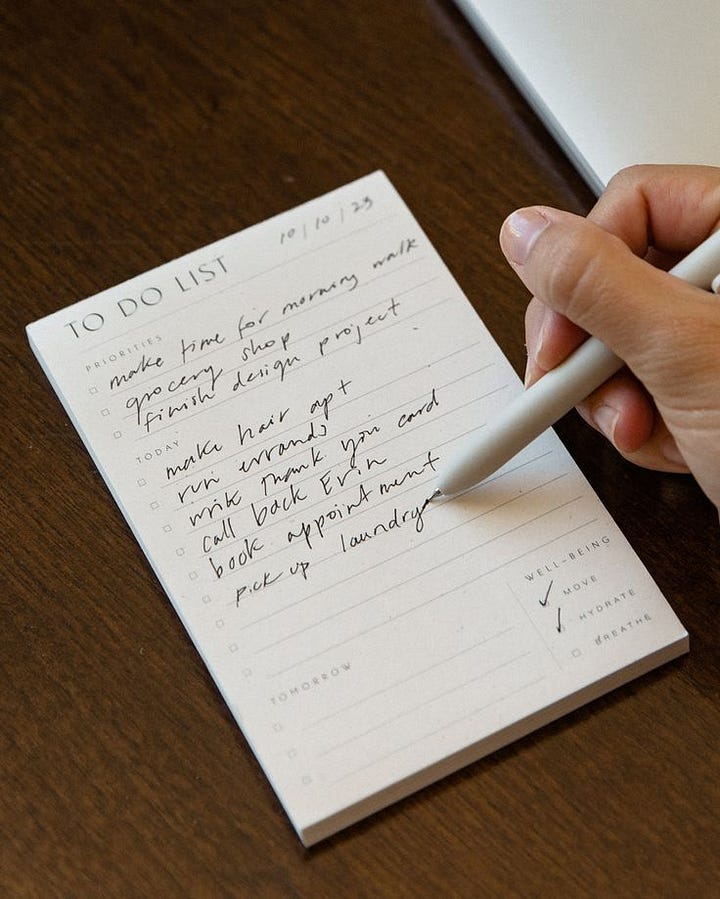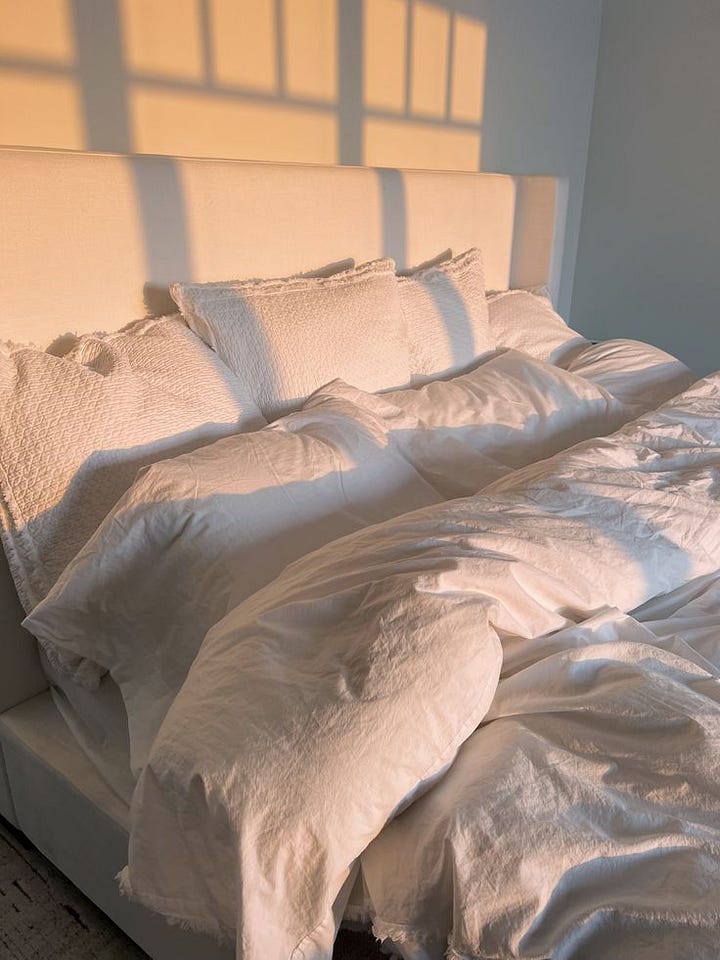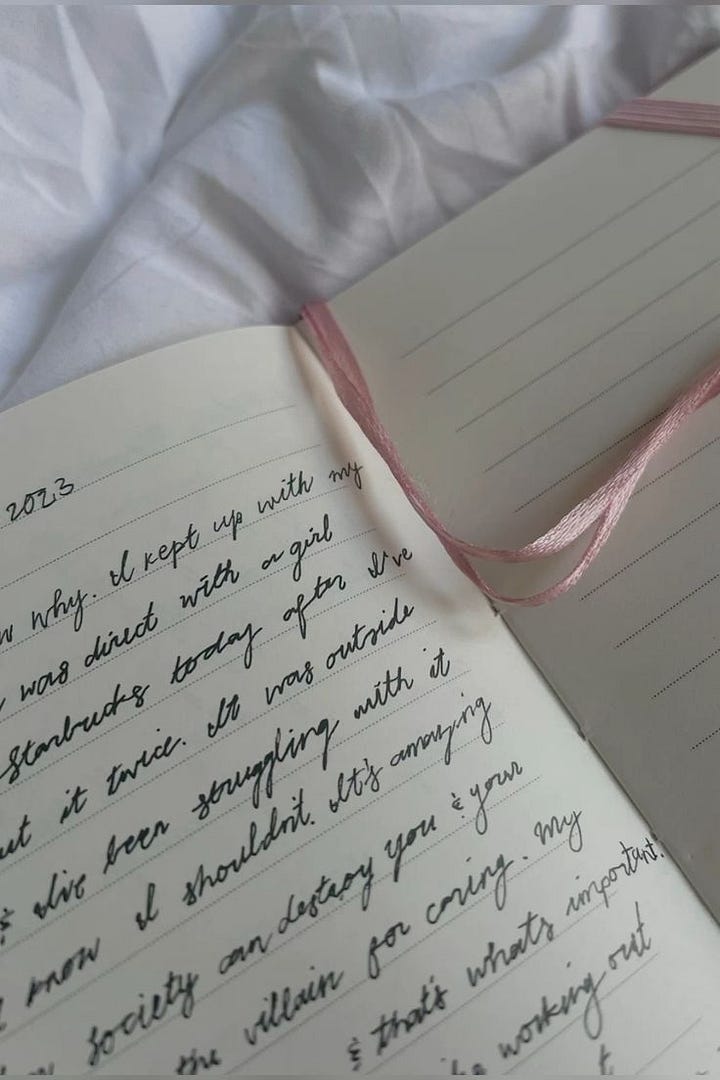Feeling Down? 12 Science-Backed Ways to Get Out of A Funk in Just One Day
#12 is my favorite
Last week, in the middle of a random Wednesday, I had this sinking feeling. I felt like something was off and I didn’t know what.
I have a new born and chronic exhaustion, so I’m familiar with feeling tired… but this felt different. Heavier. Weirder. More… out of body. Not like myself at all.
All I wanted to do was lay on the couch, watch The Crown for 7 hours straight, & eat frozen pizza and chips for dinner.
The problem is, every time I’ve done exactly this, I feel even more depleted and exhausted the next day.
So I checked in with myself. Have I…
Eaten vegetables today? No I had a energy bar & coffee for breakfast.
Exercised? No I’ve been on my phone all day.
Seen the sunlight? No it’s zero degrees outside.
Amazingly, the problem wasn’t as existential as I wanted to believe. The problem was with my routine. And that was an easy fix.
Here’s exactly what I did to get out of a funk in just one day.
It’s the bare minimum list of exactly what to do to rebalance your mind & body when you feel depleted, exhausted, and are in desperate need of a reset. Practice these 12 science-backed steps in chronological order to get out of any funk. You’ll feel back to yourself by tomorrow.
What To Do When You’re In A Funk




1. Pour yourself a large glass of water
Did you know that 1.5% dehydration can alter your mood and your performance? Drink (8) 8-ounce glasses a water (that’s one glass for every hour of the work day).
Bonus: Squeeze the juice of half of one lemon directly into 16-30 ounces of water for added electrolytes or try lmnt, a sugar-free electrolyte mix.
2. Take 10 deep breaths away from screens
As many as 80% of Americans experience email apnea - or involuntary breath holding/shallow breathing while looking at screens. Reduced oxygen intake can lead to fatigue, headaches, decreased productivity, stress, and anxiety. Step away from your devices for a 2 minute breathing break. Aim for 10 deep breaths (in through the nose, out through the mouth). Deep breathing signals to the nervous system to enter rest and digest, which will help you preserve & restore energy.
Bonus: Do this several times a day as a “mini-reset” between tasks. Before meals is a great time to practice.
3. No caffeine after 12 noon (sorry!)
The research is overwhelming that caffeine after 12 noon will disrupt your sleep. I know its tempting to have an afternoon cup of coffee (or diet coke) to get through the rest of the day, but just for today, stick to your morning dose. Make sleep a priority if you don’t want one day of tiredness to turn into several days of exhaustion.
Tip: I substitute caffeinated drinks with warm water with lemon or caffeine free tea in the afternoon
4. Prioritize what actually needs to get done, delegate/delete/delay anything that doesn’t
The weight of your to-do list (and all the things that simply cannot get done today) will cause further anxiety.
Strike a balance and commit to what you actually need to get done today, while being gentle with yourself. Aim for an achievable list of 3-5 items (ex: Rinse the dishes, put in the dishwasher & hit start, send 3 emails, attend 1 meeting, go on a walk, take a shower).
If you’re inclined to ‘do everything’: Edit your list. Cross off anything that doesn’t actually need to get done today.
If you’re inclined to ‘do absolutely nothing’: Review your list. Circle everything that must get done today. If you skip everything & wake up tomorrow with dishes everywhere, laundry piled up to the ceiling and 50 unread emails on 3 urgent projects, you’ll feel INSANE. Choose a few do-able items.




5. Move at half speed
Did you know that rushing can turn on your fight or flight response and exacerbate symptoms of stress? Slow down. Move at half speed. Instead of rushing through lunch and sending out emails as fast as you can, take your time. Taste every bite of your lunch. Write every word of an email slowly and thoughtfully. Take an extra minute to review your work. Breath.
6. Avoid making any judgements about yourself or others just for one day
When our nervous system is activated, fight or flight is engaged, and we have an increased perception of threats (even when there are none present). A perceived threat can look like:
Perceiving your friend/partner as mad at you because they didn’t text you after work. (They aren’t mad at you, they are at a networking event).
When we are in a depleted state, our thoughts and judgements are overtly negative (and largely inaccurate!) as a way to protect ourselves from “danger.” Make a commitment to avoid judgement of yourself or others just for today.
7. Disconnect from social media
Overstimulation can manifest as anxiety or inflammation in the body. Doomscrolling is not “a break.” Passive content consumption overloads your overwhelmed brain with more information to process. Give your brain a real break. Opt for low stimulation activities: get outdoors, enjoy quiet time, practice mindfulness, read a book, etc.
8. Walk outside for 5-15 minutes
Vitamin D deficiency can deplete mood & energy levels. Vitamin D is essential for bone health, immune function, and mood regulation.
When you’re in a funk the urge to snuggle up is strong (and we’ll have time for that later), but first, get outside. Bundle up if you must and walk around the block when the sun is high. The vitamin D boost will lift your mood and energy.




9. Eat plants
According to the USDA, about half your plate at each meal should be plants. Eat whatever you want: pizza, a burrito, or a pasta dish, AND add in more plants by incorporating a side salad, a baked veggie medley, a fruit cup for dessert, etc. Don’t overcomplicate it - make whatever is easy and comfortable for you. Fruits, vegetables, legumes, nuts, and seeds are rich in essential vitamins, minerals, fiber, and antioxidants. The nutrients from plants support overall health, boost immunity, and help your body function optimally.
10. Take a long, hot shower (but NOT an everything shower)
Hot showers can relieve muscle tension, reduce cortisol, and lower stress and anxiety. Skip the everything shower and instead, take a long hot shower with just the basic activities. Take your time caring for every part of your body. Go slow. Engage all 5 senses: feel the water on your skin, smell your soaps, see the steam fog up the glass, taste the water on your tongue, listen to the water droplets hit your shower floor.
11. Get in bed early
Don’t waste time on the couch after you eat dinner & shower. Get right into bed after your night time routine and begin winding down early. Aim for 7-9 hours of sleep (or more if needed).
Bonus: Make it luxurious, put on your favorite pair of pajamas, give yourself a little massage with lotion, or do a 3-5 minute stretch.
12. Brain dump
Pick up your journal and brain dump. Brain dumping is a proven way to manage mental health. Unload all of your thoughts onto the page in a stream of consciousness fashion. It can be messy and nonsensical… these pages are just for you, and you never have to read them again. Release all your thoughts and worries to make space for a new day tomorrow.
Bonus: Wrap up with 10 deep breaths to reset your nervous system and prepare for sleep
Try all 12 steps, or start with a few that call out to you. I’ve repeated this list several days in a row just because it feels so good. Let me know how it goes in the comments.
Cheers to your health.
Xoxo,
Jessie





I love 5 and 6 especially! Thanks for the reminder :)
Can’t wait to try out some of these! They are super inviting and I took some mindful breaths whilst reading it — I know I hold my breath a lot/shallow breathe, I had no idea how common it was!!